TODAY | FG06 | Drop-In | 09:30 – 11:00
Live Research Exhibition & Poster Presentations
All Welcome!
Check out our brochure to see what will be on display.
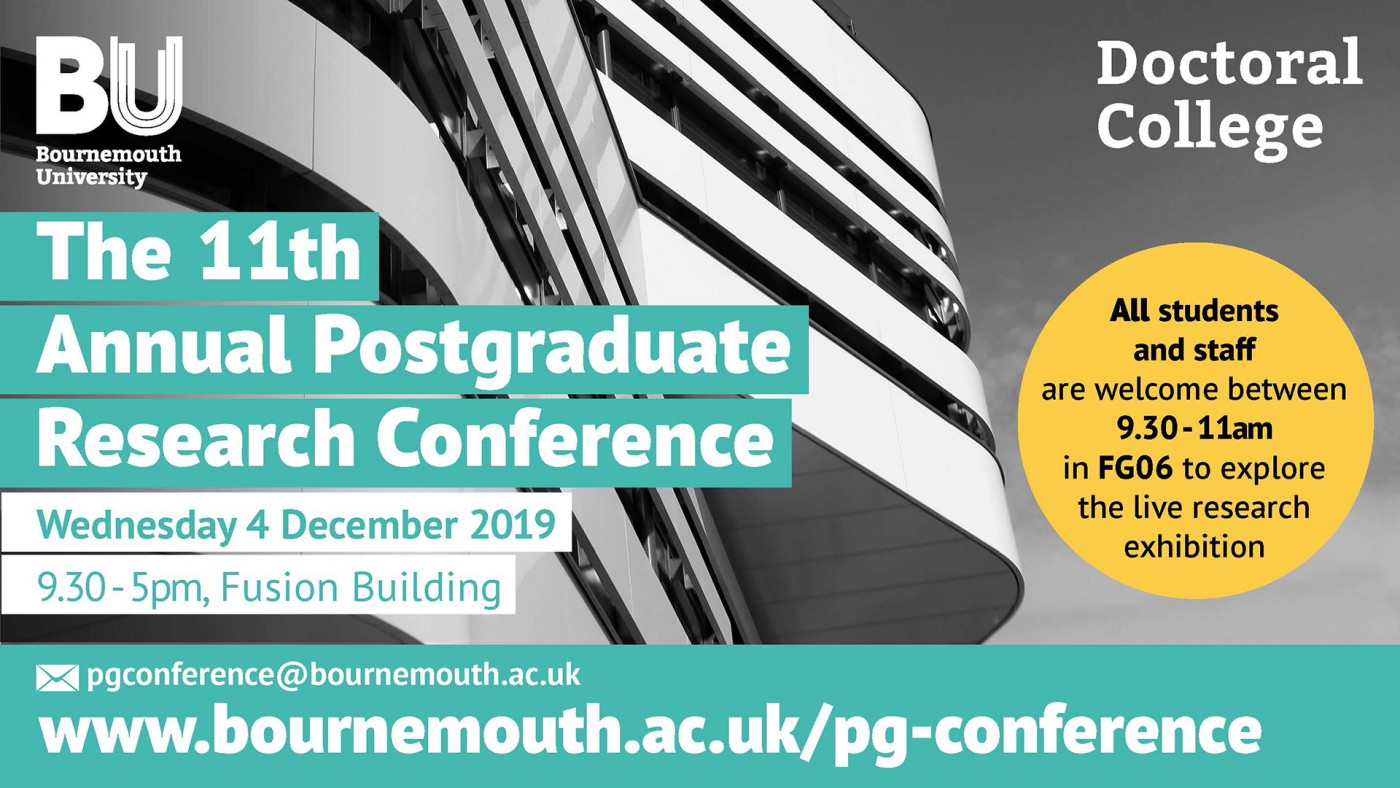
Latest research and knowledge exchange news at Bournemouth University
TODAY | FG06 | Drop-In | 09:30 – 11:00
Live Research Exhibition & Poster Presentations
All Welcome!
Check out our brochure to see what will be on display.

On 14th October 2019, Prof. Dinusha Mendis hosted the final workshop of the European Commission funded project, ‘The Intellectual Property Implications of the Development of Industrial 3D Printing’ in Brussels.
The project aims to formulate a clear picture of the Intellectual Property (IP) framework that could enhance the competitiveness of the Additive Manufacturing (AM) sector in Europe. As such, the workshop was attended by academics, practitioners, businesses and policy makers thereby bringing together key stakeholders in the field of 3D printing and IP laws.
The workshop commenced with a welcome from Amaryllis Verhoeven, Head of the Intellectual Property Unit at the European Commission. Thereafter, Dinusha Mendis (Project Lead) presented the main results, which was complemented by presentations from invited speakers and a panel discussion consisting of members of the project team and industry partners.
Ben Redwood (Hubs), Phil Reeves (Reeves Insight Ltd) and Phill Dickens (Added Scientific Ltd) considered the future of manufacturing and its different applications and uses for industry as well as consumers.
Thereafter, various issues from the Study were explored in a panel discussion. Panelists consisting of Lieven Claerhout / Bram Smits (Materialise NV), Ann Marie Shillito (Anarkik3D), and members of the project team (see below), considered IP issues in light of the views from industry, obtained as part of the Study. In bringing the workshop to its conclusion, Jean-Francois Romainville (IDEA Consult) spoke about next steps, in taking this project and other similar projects forward. Virginie Fossoul, (Legal and Policy Officer, European Commission), closed the workshop with some concluding remarks.
The presentations as well as the panel discussion can be accessed/watched here:
https://webcast.ec.europa.eu/workshop-on-3d-printing#
The project which was awarded to Bournemouth University in 2018, by the European Commission’s Directorate-General for Internal Market, Industry, Entrepreneurship and SMEs has been led by Prof. Dinusha Mendis (Principal Investigator) from the Department of Humanities and Law at Bournemouth University.
The Co-Investigators of this project include Dr. Julie Robson (Bournemouth University, UK), Dr. Rosa Ballardini (University of Lapland, Finland), Prof. Dr. Jan Nordemann (Boehmert & Boehmert, Germany), Prof. Phill Dickens (Added Scientific Ltd, UK), Dr. Maria del Carmen Calatrava-Moreno, Mr. Alfred Radauer (Technopolis Group, Austria) and Hans Brorsen (Germany).
The final project report is due for publication in early 2020.
Professor Dimitrios Buhalis will contribute to The European Conference on Aging & Gerontology EGen2019
December 07-08, 2019 University College London (UCL), London, UK
The European Conference on Aging & Gerontology (EGen) is run in partnership with The Bartlett Real Estate Institute at UCL, The National Archive of Computerized Data on Aging (NACDA) at the University of Michigan, USA, and the IAFOR Research Centre at Osaka University.

This conference brings together all disciplines to discuss in a holistic way one of the greatest challenges humanity currently faces: the ageing of the population.
https://egen.iafor.org/speakers/ #EGen2019 #ageing
See the programme http://iafor.org/archives/conference-programmes/egen/egen-programme-2019.pdf
Please note that the Central Booking Service (CBS; used to book in for review of “IRAS Form” applications and applications only requiring ethical review) will close at 4.30pm on Wednesday 18 December 2019 and will re-open at 9am on Thursday 2 January 2020.
If you need to book in your project for NHS REC review please take note of this Christmas closure.
Any queries please email Research Ethics.
 EMA held its 6th triennial education conference in Malmo, Sweden from the 28-29 November 2019. Dr. Luisa Cescutti-Butler and Professor Sue Way had three abstracts accepted, two of which highlighted units of learning in our midwifery undergraduate programme (Evaluating the student experience of introducing newborn infant physical theory into a pre-registration midwifery programme in the UK and An evaluation of the student experience of peer facilitated learning) and a further one which was focused on a national collaborative project on grading practice (Developing a set of key principles to achieve consistency in assessing pre-registration midwifery competency in practice in the UK). The opening keynote speaker at the EMA Conference was Fran McConville – Midwifery Expert at WHO. Fran presented on ‘Strengthening Quality Midwifery Education for Universal Health Coverage 2030’. Our takeaway message from her presentation was the following important statement: “When midwives are educated to international standards, and midwifery includes the provision of family planning……more than 80% of all maternal deaths, stillbirths and neonatal deaths could be averted”.
EMA held its 6th triennial education conference in Malmo, Sweden from the 28-29 November 2019. Dr. Luisa Cescutti-Butler and Professor Sue Way had three abstracts accepted, two of which highlighted units of learning in our midwifery undergraduate programme (Evaluating the student experience of introducing newborn infant physical theory into a pre-registration midwifery programme in the UK and An evaluation of the student experience of peer facilitated learning) and a further one which was focused on a national collaborative project on grading practice (Developing a set of key principles to achieve consistency in assessing pre-registration midwifery competency in practice in the UK). The opening keynote speaker at the EMA Conference was Fran McConville – Midwifery Expert at WHO. Fran presented on ‘Strengthening Quality Midwifery Education for Universal Health Coverage 2030’. Our takeaway message from her presentation was the following important statement: “When midwives are educated to international standards, and midwifery includes the provision of family planning……more than 80% of all maternal deaths, stillbirths and neonatal deaths could be averted”.
On the social side we were privileged to a hear a woman from the Sammi tribe in Sweden sing three traditional songs and a tradition adopted from Syracuse in Sicily which was the ‘Santa Lucia’ group of singers celebrating the start of Christmas who sang Xmas Carols in Swedish. We were also able to network with some significant and contemporary midwifery leaders such as Gill Walton (CEO of the Royal College of Midwives), Fran McConville (WHO) and Grace Thomas, Reader and Lead Midwife for Education (Cardiff University).
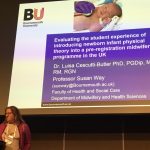
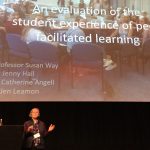
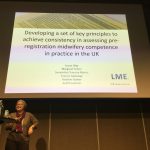
The National Institute for Health Research (NIHR) is the nation’s largest funder of health and care research – the NIHR oversee 15 Clinical Research Networks (CRN) and these CRNs work alongside NHS Trusts, primary care providers and Universities. Each CRN has a dedicated Study Support Service.
The NIHR have a portfolio of research studies that are eligible for consideration for support from the CRN in England. Portfolio status is usually vital to participating NHS Trusts when considering undertaking a proposed study.
Information on the NIHR portfolio is present on the research blog, but at this session our local CRN’s Study Support team will provide you with an opportunity to hear about and discuss the network and the service, and how it could benefit you.
This session is aimed at those planning on conducting clinical research.
It is also designed to raise awareness at BU about the benefits and importance of the NIHR portfolio, so if you’re just interested in learning more, please book on.
The session will take place next week on Tuesday 10th December at 2:30pm until 4:00pm on Lansdowne Campus.
To register your interest or if you have any queries, please get in touch with Research Ethics.
Suzy Wignall (Clinical Governance Advisor – Research Development & Support) and Juan Campos-Perez (Clinical Research Coordinator – Bournemouth University Clinical Research Unit) have compiled a checklist (PDF and word formats) that can be used to support researchers through the process of applying for and conducting clinical research.
The document contains links to various documents and further resources to guide researchers through areas such as applying for external approvals, running the study and closing the study. The checklist clearly sets out what tasks are required, the support/resources available to complete this tasks, a space to write your own notes/how this task was resolved and the date it was completed. Using this document will help you ensure that all the required tasks are completed during your research journey.
The document is also here on the Clinical Governance blog.
Remember – support and guidance is on offer at BU if you are thinking of conducting clinical research, whether in the NHS, private healthcare or social care – contact details for Suzy and Juan are on the checklist, and you can also take a look at the Clinical Governance blog for resources and updates.
Involving the public in your study is important, especially at the research design stage. This is called ‘Public Involvement’ (also known as ‘PPI’ [Patient and Public Involvement]). Public involvement in research means research that is done ‘with’ or ‘by’ the public, not ‘to’, ‘about’ or ‘for’ them.
By seeking the opinions and recommendations of the public, it is a great way to ensure that your study is designed and set-up in a way that will be relevant to participants, and of good quality.
This can also help to avoid any setbacks once the project is underway.
The new UK Standards for Public Involvement have now been released and were developed over three years by a country-wide partnership between the National Institute for Health Research (NIHR), Chief Scientist Office (CSO) Scotland, Health
and Care Research Wales, and the Public Health Agency Northern Ireland
They describe what good public involvement looks like and encourage approaches and behaviours that are the hallmark of good public involvement such as flexibility, sharing and learning and respect for each other.
You can see the six UK standards and supporting materials, as well as further details about the partnership, project and the piloting of the new standards, here.
Further guidance is available via the Clinical Governance section of the Research blog and via the Health Research Authority and NIHR pages.

On Weds 20th November, BU were delighted to welcome Dr Tracey Henshaw, Assistant Director of Leverhulme Trust to speak about the funding opportunities available from Leverhulme. Tracey provided an overview of who the Leverhulme Trust are, what they will (and won’t!) fund, their funding programmes, and what they are looking for in funding applications including useful hints and tips for their main programmes.
You can now view the slides via Brightspace here.
The understanding of human anatomy is vital to the delivery of healthcare. In medical education, this has historically been done through direct dissection of human cadavers by medical students or close observation of such dissection by an anatomist. This helps with the development of a comprehensive understanding of the three-dimensional relationships of the structures human body in health and disease. The intricate complexity of the human nervous system, combined with the vast range of neurological diseases make this area one of the most challenging for medical education.
The computer animation and visualisation skills already at BU offer a unique opportunity to develop a suite of tools ready for the influx of medical students using immersive virtual reality and mixed reality techniques. The primary aim of the project is to develop a medical teaching platform that provides an anatomically correct three-dimensional teaching tool using virtual reality and mixed reality such as Microsoft’s HoloLens 2. This will facilitate a deeper understanding of the human body in real individuals. The platform will be developed to allow immersion in a range of clinical scenarios and provide virtual training for students to supplement live clinical experience. This approach will be supported with modular teaching tools and case scenarios derived from real cases and outcomes. Future developments of the platform will include decision support tools, case recording and data analytics tools to support machine learning and personalised actionable analytics.
The project will blend cutting-edge animation/visualisation techniques with digital health approaches with human-centred design principles to provide a platform to train the next generation of healthcare professionals. The project aim is to build on work already undertaken between BU and NHS organisations in Dorset to develop a blended reality platform for undergraduate medical teaching and postgraduate training. Large clinical datasets from existing data repositories in Dorset will be used to train machine learning driven education and decision support tools using supervised learning. Prospective clinical data collection using the de-identification/re-identification pipeline being developed as part of the Dorset informatics strategy will be subjected to unsupervised learning approaches to evaluate and improve accuracy.
The project is funded through HEIF6 running from November 2019 until July 2022. Please contact Dr Xiaosong Yang (xyang@bournemouth.ac.uk) or Dr. Rupert Page (Rupert.Page@poole.nhs.uk) if you have any questions about the project.
The deadline for the research impact fund is fast approaching, on Thursday 12 December. Join our panel members at the last few drop-in lunch time surgeries to discuss your ideas.
If you’re not sure which strand to apply for, or you have any queries about the guidance or application form, then come along and let us help you.
| Monday 2 December | Lansdowne Campus – EB303 | 12:30 – 13:30 |
| Thursday 5 December | Talbot Campus – F206 | 12:30 – 13:30 |
| Tuesday 10 December | Talbot Campus – F304 | 12:30 – 13:30 |
| Wednesday 11 December | Lansdowne Campus – EB603 | 12:00 – 13:00 |
Applications must be submitted to researchimpact@bournemouth.ac.uk by 5pm on Thursday 12 December. To apply, please read the policy, application form and guidance.
If you can’t make any of the drop-in surgeries but you’d still like to talk to someone about your application, please email Genna del Rosa (Panel Secretary) or contact your Faculty Impact Officer:
Are you interested in running your own research project within the NHS? Good Clinical Practice, or ‘GCP’, is a requirement for those wishing to work on clinical research projects in a healthcare setting.
GCP is the international ethical, scientific and practical standard to which all clinical research is conducted. By undertaking GCP, you’re able to demonstrate the rights, safety and well-being of your research participants are protected, and that the data collected are reliable.
The next GCP full day session is scheduled for Wednesday 15th January at Bournemouth University –08:45am – 4:30pm.
The day will comprise of the following sessions:
If you’re interested in booking a place, please contact Research Ethics.
Remember that support is on offer at BU if you are thinking of introducing your research ideas into the NHS – email the Research Ethics mailbox, and take a look at the Clinical Governance blog.
A shorter update this week as specific HE policy matters are taking a back seat to the main campaigns.
We’ve summarised the relevant parts of the Conservative and other manifestos released since our last update. You can read it here. And here is the link to read the Conservative manifesto in full. The manifesto was widely reported on by the media as ‘not rocking the boat’ and few unexpected commitments. A stark contrast to the radical Labour manifesto. Research Professional say:
“…the level of detail is so vague that a huge spectrum of potential changes could legitimately be claimed in years to come to fit within these manifesto commitments. That’s probably by design and possibly not everyone will sleep easy as a result.” (Research Professional, Monday 25 November 2019). The Conservative manifesto noticeably shorter than some of the others and peppered with pictures of Conservative candidates related to their work roles throughout.
Jane has produced a comparison of the major parties take on the key HE issues.
And sector bodies are all producing their own comparators, here’s a short one from UUK; HEPI have yet another election briefing; and NESTA are looking to the future and considering the challenges around the knowledge economy in what the next UK Government should do.
GuildHe have published their priorities for government.
Further to their published promises The Labour Party have also launched a Race and Faith Manifesto pledging to ensure that BME people will be properly represented at the top of public life and to ensure the education curriculum teaches the historical injustices of colonialism and teaches Black history. In the launch Corbyn noted there are only 25 Black women professors in UK universities. They also said they would overhaul the OfS to review the state of inequality across HE and the steps needed to address it alongside better BAME teaching representation within schools and tackling the higher exclusion rates among BAME pupils. Meanwhile, Shadow Chancellor, John McDonnell, has promised an official consultation on clearing student debt.
An exclusive in The Tab, suggests that Labour would conduct a formal review into existing student debt.
The Scottish National Party released their manifesto on Wednesday. Their key priorities are Brexit, the NHS and a further Scottish Independence referendum. We include brief mention of their HE relevant manifesto points here because of their potential to support Labour should they be in position to form a minority Government.
The Universities and Colleges Admissions Service published its first report on end of cycle undergraduate acceptance, offer and entry rates.
In 2019, 97.8% of UK 18 year olds applying through the UCAS main scheme received at least one offer. …This record-breaking figure is likely a consequence of both:
The UK 18 year old population is expected to fall to its lowest point in recent years in 2020. Consequently, now may be the best time ever to apply to higher education – particularly since this population is expected to grow again from 2021, reaching 2010’s height by 2024.
Findings from the 2019 cycle also suggest that applicants should not be deterred from applying to courses with challenging entry requirements. Universities and colleges frequently accept applicants who perform below their entry requirements. Encouragingly, this is most often experienced by disadvantaged applicants. In 2019, 60% of POLAR4 quintile 1 placed applicants were accepted on courses with actual A level grades below advertised entry requirements (compared with 49% across all placed applicants).
On A level results day this year, almost all UK universities and colleges had courses available in Clearing. This covered over 30,000 courses.
University of Lincoln vice chancellor Mary Stuart launched the report from their 21st Century Lab project. The University of Lincoln’s manifesto, calls for “permeability” as the organising principle for universities in the 21st century. The manifesto identifies ten global grand challenges.
Read more:
The Social Market Foundation (SMF) have issued a press release ‘Class ceiling’ costs working class graduates £1,700 [per year] highlighting how much less a graduate from a deprived background earns compared to a wealthy graduate. The press release says:
The research is London-centric with all participants come from and living in London, therefore caution is needed when generalising these findings to other areas. However, the study is of interest because London is ahead of the game in ensuring access to HE for students from disadvantaged backgrounds.
James Kirkup, SMF Director, said:
Click here to view the updated inquiries and consultation tracker. Email us on policy@bournemouth.ac.uk if you’d like to contribute to any of the current consultations although there isn’t much action at present because Parliament activity has ceased during purdah.
Refugees: There has been increasing talk of how Universities assess and support refugees this week. Insecure housing, no certification or proof of prior education levels, conversational challenges, lack of financial income, financial restrictions (or requirement to pay international fee levels), and social and cultural barriers all stand in the way of refugees accessing Higher Education. A Guardian article highlights Unesco’s new global convention on the recognition of HE qualifications and equivalency and urges universities to assess refugee applicants differently to overcome paperwork barriers. It also says the need for innovative and tech-supported approaches to tackle delivery in refugee camps and other difficult environments. The Guardian article says:
Regional divide: The Institute for Public Policy Research North has published Divided and Connected reporting on regional inequalities in the north, the UK and the developed world. Finding that the UK is more regionally divided (on health, jobs, income and productivity) than any other comparable advanced economy. The report blames centralised governance and argues for greater devolution.
To subscribe to the weekly policy update simply email policy@bournemouth.ac.uk
JANE FORSTER | SARAH CARTER
Policy Advisor Policy & Public Affairs Officer
Follow: @PolicyBU on Twitter | policy@bournemouth.ac.uk
In the past months, I have been collaborating with the University of Naples Parthenope, and in particular with pedagogy Professor Maria Luisa Iavarone and PhD candidate Ferdinando Ivano Ambra.
We have been working on a conference paper that covers the recent results of the S.M.A.R.T. questionnaire. A questionnaire developed in Italy to look at different aspects of human behaviour (including eating habits, sleeping patterns, relationships, and use of technologies) in the young population.
The abstract was successfully accepted and presented at the 2nd Conference on Well-being in Education Systems. I have asked Ivano to tell us a little bit about the journey he had.
From the 12th to the 15th of November I was in Locarno (Switzerland) to present the results of the research titled “The impact of sport training on healthy behaviour in a group of 108 adolescents: a pilot study using the S.M.A.R.T. questionnaire” at the “2nd Conference on Well-being in Education Systems”.
The University of Applied Sciences and Arts of Italian Switzerland (SUPSI) organised a very informative conference, giving to all the attenders enough information and materials to follow all three days of presentations.
The aim of the conference was innovation in education and psychology fields. I found of particular interest the work about emotional intelligence and creativity presented by Professor Brandao de Souza and Professor Pasini. I also found very stimulating the symposium of Professor Noto from the University of Padova who discussed the education systems and how it applies to the work-environment in an inclusive way.
The posters session as well offered food for thought, such as the research of Professor Iorio and Professor Ambrosetti on students perception of teachers’ burnout.
During the social event I had the chance to meet the other lecturers part of the scientific panel of the conference: Prof. Castelli, Prof. Marcionetti, Prof. Plata, Dr Ambrosetti and the director of the Center of innovation and Research on Education System (CIRSE) Prof. Egloff.
I am grateful to have had the chance to participate in the conference. It was an occasion of professional growth and personal improvement.
If you want to read the paper submitted, it is now fully available on ResearchGate
If you want to discuss the findings with Ivano or the other members of the project, follow the links below
 |
PhD candidate Ferdinando I. Ambra ivano.ambra@uniparthenope.it |
|
|
Professor Maria L. Iavarone marialuisa.iavarone@uniparthenope.it |
 |
Dr Francesco V. Ferraro fferraro@bournemouth.ac.uk |
Thank you for your attention,
Dr Ferraro
fferraro@bournemouth.ac.uk
www.ferrarotrainer.com
 Every BU academic has a Research Professional account which delivers weekly emails detailing funding opportunities in their broad subject area. To really make the most of your Research Professional account, you should tailor it further by establishing additional alerts based on your specific area of expertise. The Funding Development Team Officers can assist you with this, if required.
Every BU academic has a Research Professional account which delivers weekly emails detailing funding opportunities in their broad subject area. To really make the most of your Research Professional account, you should tailor it further by establishing additional alerts based on your specific area of expertise. The Funding Development Team Officers can assist you with this, if required.
Research Professional have created several guides to help introduce users to Research Professional. These can be downloaded here.
Quick Start Guide: Explains to users their first steps with the website, from creating an account to searching for content and setting up email alerts, all in the space of a single page.
User Guide: More detailed information covering all the key aspects of using Research Professional.
Administrator Guide: A detailed description of the administrator functionality.
In addition to the above, there are a set of 2-3 minute videos online, designed to take a user through all the key features of Research Professional. To access the videos, please use the following link: http://www.youtube.com/researchprofessional
Research Professional are running a series of online training broadcasts aimed at introducing users to the basics of creating and configuring their accounts on Research Professional. They are holding monthly sessions, covering everything you need to get started with Research Professional. The broadcast sessions will run for no more than 60 minutes, with the opportunity to ask questions via text chat. Each session will cover:
Each session will run between 10.00am and 11.00am (UK) on the fourth Tuesday of each month. You can register here for your preferred date:
These are free and comprehensive training sessions and so this is a good opportunity to get to grips with how Research Professional can work for you.
 By clicking on this box, on the left of the Research Blog home page just under the text ‘Funding Opportunities‘, you access a Research Professional real-time search of the calls announced by the Major UK Funders. Use this feature to stay up to date with funding calls. Please note that you will have to be on campus or connecting to your desktop via our VPN to fully access this service.
By clicking on this box, on the left of the Research Blog home page just under the text ‘Funding Opportunities‘, you access a Research Professional real-time search of the calls announced by the Major UK Funders. Use this feature to stay up to date with funding calls. Please note that you will have to be on campus or connecting to your desktop via our VPN to fully access this service.
The journal Leadership has published the paper “Mirror, Mirror on the Wall: Shifting Leader-Follower Power Dynamics in a Social Media Context“.
Congratulations to the Faculty of Management team: Parisa Gilani (Department of People & Organisations), Elvira Bolat (Marketing, Strategy & Innovation), and Donald Nordberg (Accounting, Finance & Economics), as well as alumna Claudia Wilkin.
It’s a case of staff-student co-creation that also integrates themes across the business and management disciplines.
Attendance is free – fully funded places are also available (inc accommodation, travel etc.)

This one-day workshop aims to provide early-career researchers with the opportunity to explore creatively and practically the public engagement and participatory potential of their work, and to learn about the often complex relationship between such activities and the requirements of impact narratives.
The workshop is free, and it is open to doctoral and early-career researchers from across the arts and humanities. If you can fund travel, accommodation and subsistence then just register and attend. However, there are also twenty fully funded places available to those whose research broadly aligns with the project’s themes and/ or methods, including (but not limited to): women’s and gender studies; women and war; memory studies; histories of war and conflict; trauma studies; oral history; participatory arts; women’s writing. More details on registering and applying for funded places can be found on the Eventbrite page.
Thursday 9 January 2020 – 9:30 AM – 5:00 PM
Liverpool John Moores University
The deadline for applying for funded places is 13 December 2019
We’re continuing our look back at the ESRC Festival of Social Science with this final instalment, you can catch up on our coverage so far on the Research Blog.
On Saturday, Dr Ann Luce drew the Festival to a close with a comprehensive look at ‘Suicide in the media’, bringing her own research into ethical reporting, along with Gifty Markey from the NHS, and Joy and Nigel Ford, who shared their story and offered peer counselling.
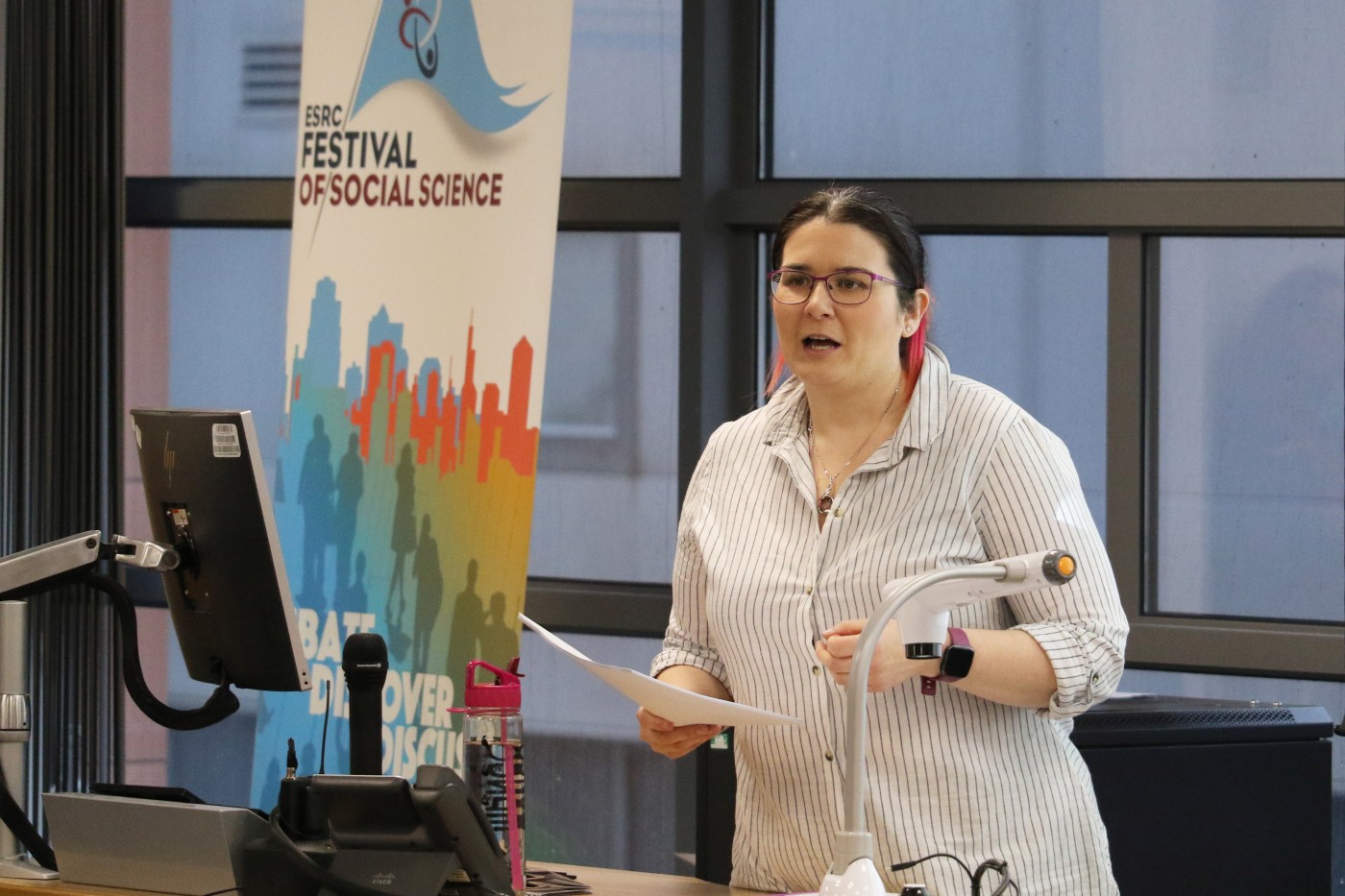
Dr Ann Luce, BU
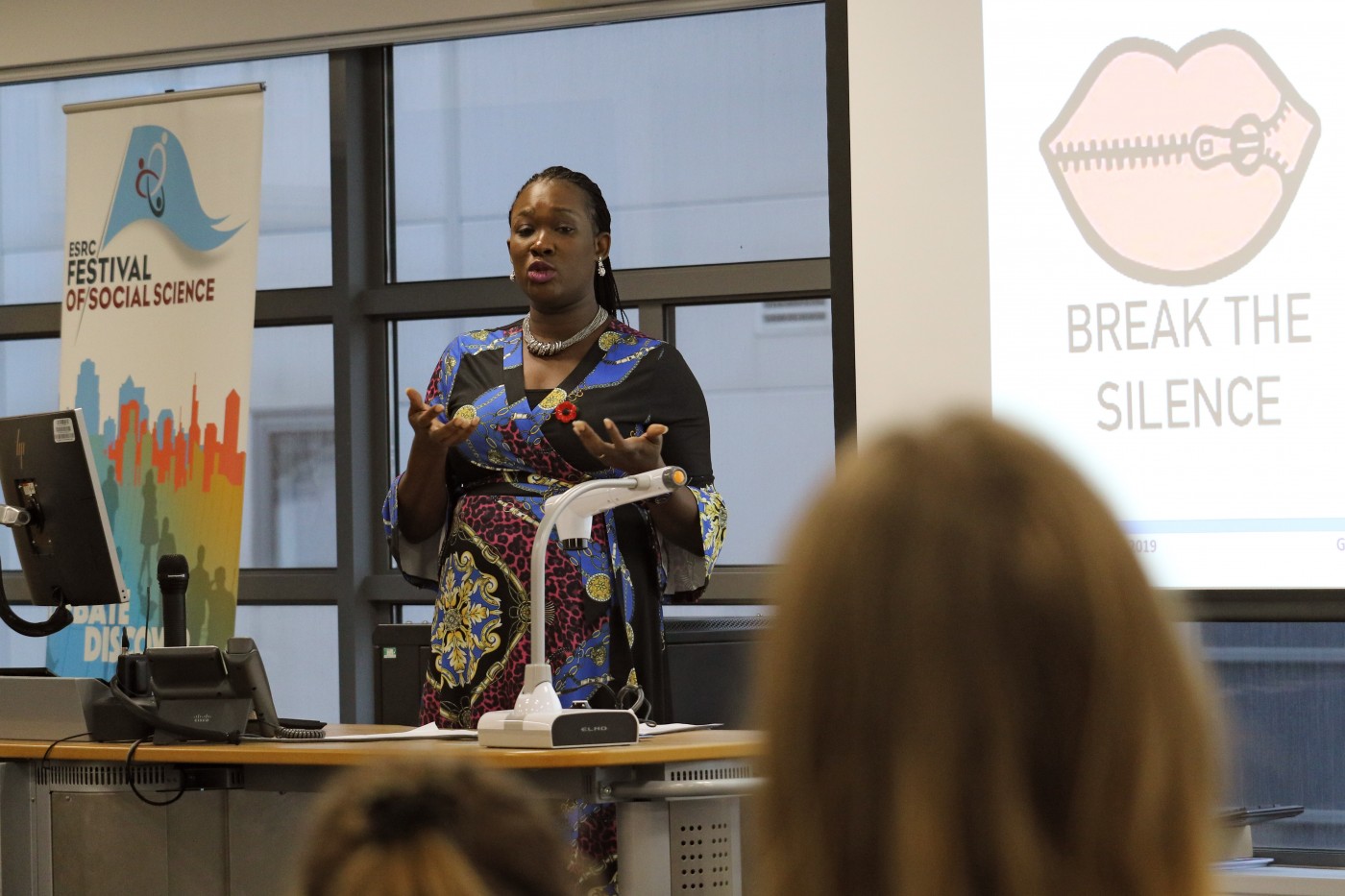
Gifty Markey, NHS
Ann led an in-depth workshop into how real-life stories of suicide had been reported in the media, encouraging plenty of thoughtful discussion.
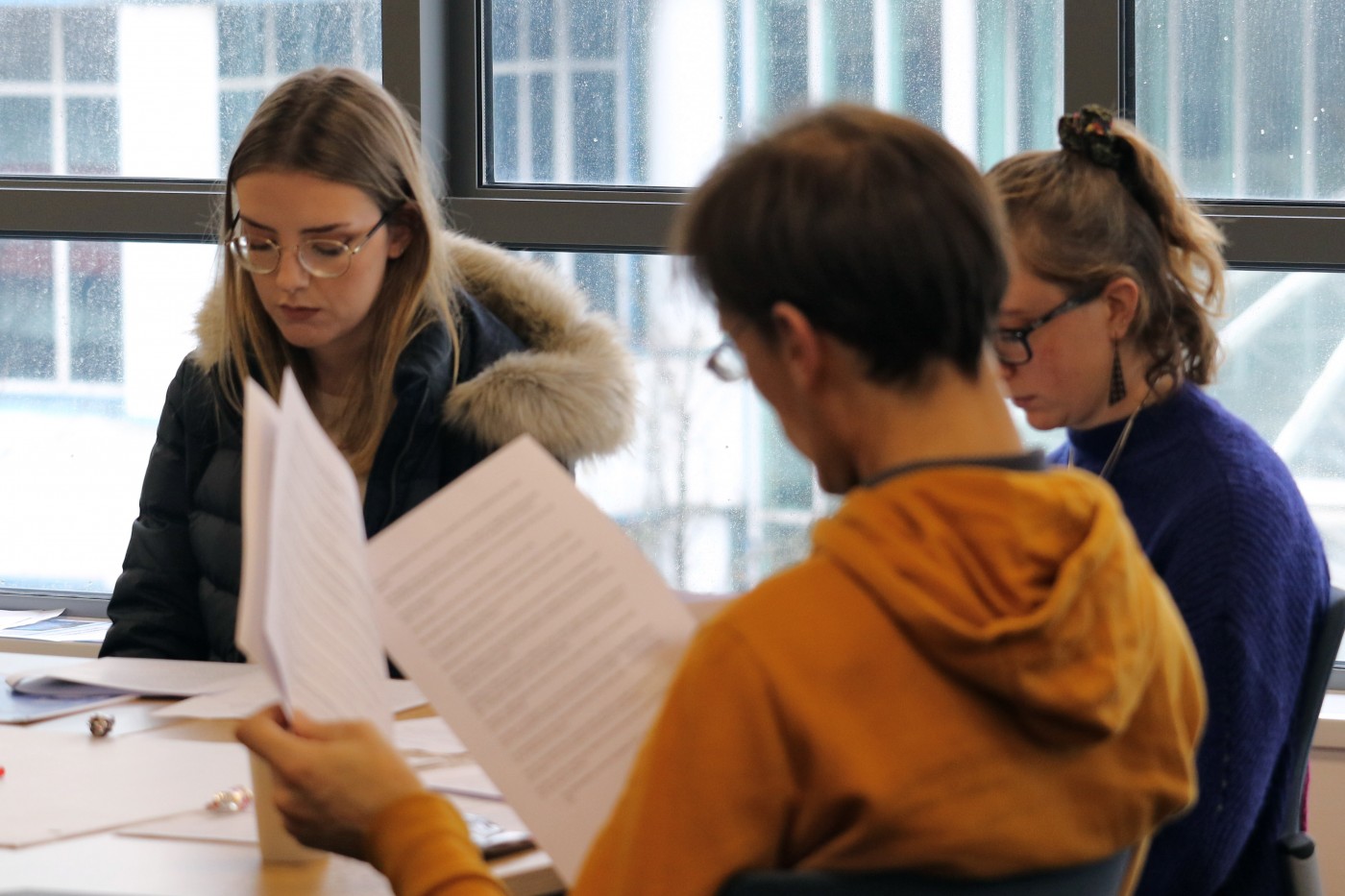
The Festival displayed the breadth and quality of social science research at BU, demonstrating its relevance to everyday life and power to bring about social change. These events opened up academic research to a wider audience, bringing in external partners and contributors, as well as varied public audiences. As a result, both academics and the wider public felt the benefits of two-way engagement with research.
Calls for future iterations of the ESRC Festival of Social Science will be advertised on this Research Blog. In the meantime, if you’ve been inspired to do your own public engagement activity then please contact the Public Engagement with Research team at publicengagement@bournemouth.ac.uk, who can provide advice and support.